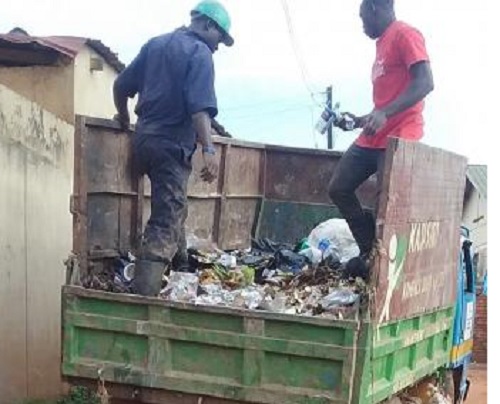
Kampala, Uganda | THE INDEPENDENT | In a hustle to find a job, Peter Mubiru was introduced to the garbage world. Today Mubiru earns a living from collecting domestic waste across Kampala.
Mubiru’s working day starts at 7 a.m., and unlike others, endures hours of standing at the back of a filthy garbage filled truck. At every stop, bags of unsorted garbage are loaded, covered in various stenches, giving him more work for the day. Where you see garbage, he scoops a treasure.
His job is to separate organic domestic waste, plastics from decomposable material en-route the dumping site. Dressed in overalls, gumboots and a helmet, Mubiru uses bare hands to sort through the waste. His face too is exposed. However, to him what matters is to make a living.
This is a job like any other, he seems to say when a URN reporter asked if he does not find it disgusting using his hands to sort waste.
“This garbage is money. How can I find it disgusting? Every day I work, I am paid more than 10,000 Shillings. There is nothing disgusting about this because we wash our hands after with soap and water,” Mubiru said.
He explains that with bare hands, waste sorting becomes easier than when one uses gloves which according to him are thick and slippery.
But Medics say that direct handling of solid waste can result in various types of infectious and chronic diseases. Research has also shown that certain chemicals, if released untreated, are highly toxic and exposure can lead to chemical poisoning, disease or death.
Studies have detected excesses of cancer in residents exposed to dust and hazardous compounds with organic domestic waste having one of the most serious threats. Since they ferment, they create conditions favorable to the survival and growth of microbial pathogens which cause skin and blood infections, eye and chronic respiratory diseases, and intestinal infections that are transmitted by flies feeding on the waste.
“People who live or work at landfills are exposed to many toxins and are likely to have problems with their respiratory system,” Dr Medard Karyoko Ebyarimpa, a Senior Consultant attached to Ntinda Health Centre told Uganda Radio Network in an interview.
However, Dennis Mushabe, the chairman of Kampala Solid Waste Management Consortium-KASASIRO, says all health hazards that garbage collectors are exposed to are a result of poor garbage disposal habits by people who generate waste.
KCCA, on the other hand, says that waste sorters like Mubiru contravene the authority’s waste disposal regulations. These regulations include using hand industrial type rubber gloves with grips and easy to wash cotton protective clothes, as well as mouth and nose masks. Supervisors are also required to send back workers that do not wear proper protective equipment.
But Dr Daniel Okello, the acting Director of Public Health and Environment says that it is hard to get garbage collectors to follow the law.
“All these companies know the rules and some of them try to provide protective equipment for their workers but some of them do not use them. They decide to use their hands. What can you do then?”
On a daily basis, 2000 tons of garbage are collected within Kampala, according to KCCA and taken to Kiteezi landfill. At the landfill, a number of people sort the rubbish before it’s sold to recycling companies.
Yahya Omari, a group leader of a community that sorts garbage outside the landfill says due to the waste they are exposed to, regular hospital visits are inevitable.
*****
URN
 The Independent Uganda: You get the Truth we Pay the Price
The Independent Uganda: You get the Truth we Pay the Price



